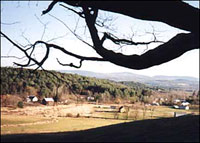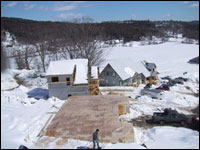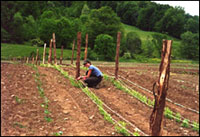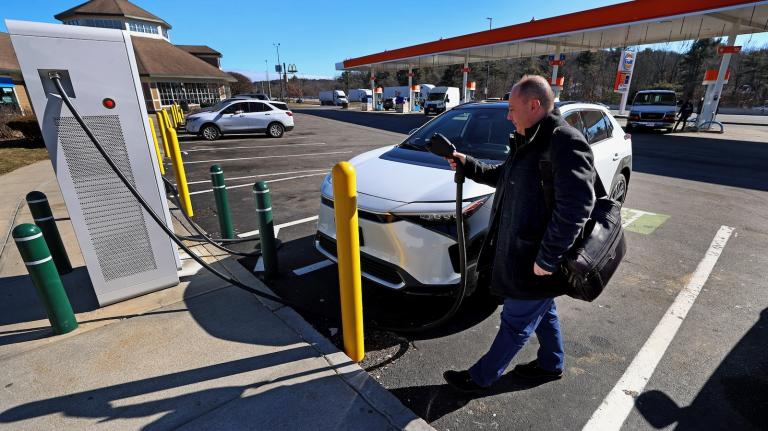At 9:30 at night the phone rings. It is my neighbor Lorie, who asks me if I’d mind stepping out onto my porch for a minute. I think I know what this is about. Up the hill on Tom and Lorie’s porch there are candles burning on tables covered with the scattered remains of dinner. Children are lounging in laps. Someone is strumming a guitar. I don’t know if they can see me, so I call out to them. The guitar gets louder. People begin to sing. It is my birthday, and my neighbors are serenading me.

A Cobb-hilled together community.
It is almost exactly two months since my family moved into our house, clustered with 22 others on this hillside in Vermont. Our new home is part of Cobb Hill Cohousing. Not only do we own this snug, sturdy half of a duplex, we are also part-owners of more than 200 acres of farmland and forest, a few barns, and a soon-to-be-completed “common house” where we will have space for meetings, dances, and big community dinners. I listen to the laughter from the next porch, look around me at the lights in the windows across the way, and give thanks.
Six years ago, a group of strangers and causal acquaintances met on a farmhouse porch in New Hampshire to talk about what we longed for — community, contribution, a working farm, land to care for, a place for children to grow up with a sense of belonging. I was astonished to discover that these people seemed to be yearning for the same things I was. Right away, I sensed that if this thing we were proposing really happened, I would be changed by it. If I had been a parent then, I might have understood that change as akin to what happens when you have a child — when you open your heart to something fragile that lives beyond your control.
Now I am a parent; when we moved here two months ago, I watched my five-year-old daughter carry fairly substantial boxes up onto our rental truck. I was amazed that a child who was not even conceived at the time of those early meetings was now big enough to help with the move. If someone had told me, at that first meeting, that I would be the mother of a kindergartener by the time I lived wherever it was we were going to end up, I would have laughed out loud — or fled the whole project. I would not have believed that it could take so long to bring our dream to fruition.

Building the dream.
It has taken six years to move from discussions of a different relationship with land and food to this hillside, with its patchwork of vegetable gardens, hayfields, pasture, sugar-bush, and forest. Six years for decisions to emerge from dreams: Yes, we will live on these farms, not any of those others. No, we won’t live in dorm rooms and share one common kitchen. Yes, we will build near the village and not at the far, beautiful end of our land. No, we won’t have a constructed wetland, but yes, we will have composting toilets.
Very little here is exactly as I imagined it would be, but it is what it is. And it is beautiful: when the mist rises in the morning, when the children run through the tall grass, when we admit that we don’t know what we are doing but hold fast to our conviction that there is a better way. We carry our fears for the world, and our fears for our children, and our own imperfections, and still insist that we know beauty when we see it. I wouldn’t say we’ve arrived at any of those goals we listed on the farmhouse porch six springs ago. But to be here with a group of people who insist that those goals are possible and worthy is an incredible gift.

At work in the community garden.
I keep waiting to feel as though I have arrived at my destination, or at least that I am beginning on a new path. But moving in hasn’t felt so momentous after all. Things just keep going along. Tomorrow, there is a chicken coop to clean and raspberries to pick. There is a meeting to organize. There are children who would like a grown-up to walk with them in the woods; there is the first ripe tomato to bring home for supper. Slowly, I am realizing that this community is nothing like a final destination. It is simply a place from which we keep on going, doing the best we can and savoring what we have been given.
In this world with its violence and poverty, its hungry children and threatened habitats, I search for something in my own experiences with Cobb Hill to offer about making progress toward dreams. But what I am left with feels not all that wise. I wish I knew some method to move dreams forward more quickly, and along a straighter path. But maybe it’s for the best that I don’t. These slower, winding paths have their bumps and surprises, their sadness and loss; they spell more work than you could ever have expected at the outset, and perhaps more than you thought yourself capable of taking on. But it’s because of the bumps in these roads that things can shift. New ways can grow out of old. Bit by bit, a vision can grow into something solid, a reality. And that new solid thing you have created provides a place to stand and see the next bit of vision as it stretches out in front of you.


